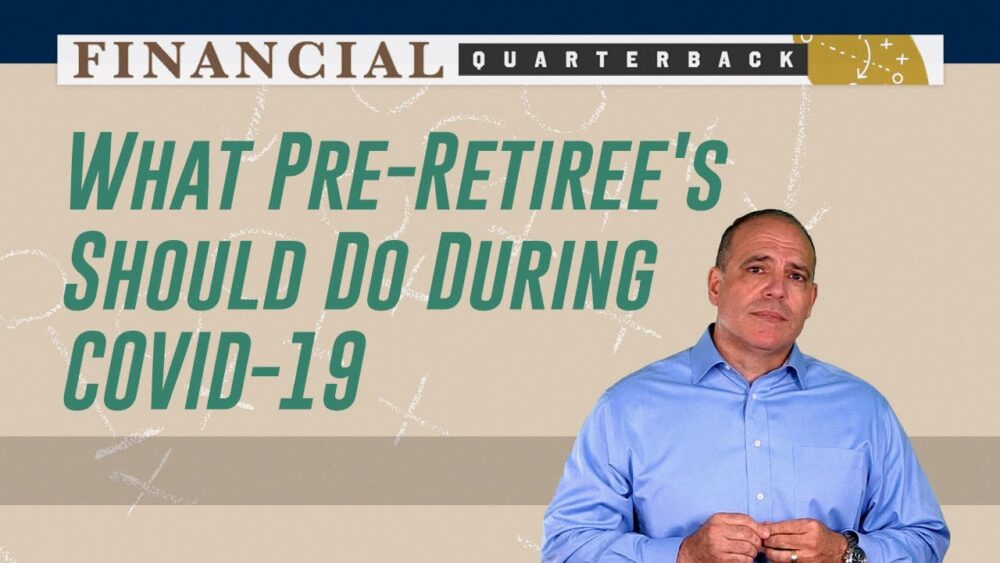I have found that 55 is usually that arbitrary point where, depending on when you expect to retire, you’re starting to think more seriously about those post-65 years.That retirement clock starts getting louder and louder and louder. The term “long-term” is not so long anymore. So if you are around 55 to 65 years old—especially during this COVID-19 pandemic—chances are that those investments have been beat up.
It is important that you take this time to focus on building, catching-up, and implementing a real retirement plan.
Here are some basic things to review as you begin to think more seriously about retirement:
1. Start With Your Guaranteed Income
The very first thing we need to determine is what will be our guaranteed income sources for retirement. This is where we begin to review and learn about our Social Security, pensions, and maybe other sources of guaranteed income we might have.
These income sources will build our foundation for our retirement income.
We must begin by reviewing our expected benefits and what will be the best way to maximize them.
Understand that Social Security has several ways to structure your benefits that can differ depending on your marital status. There are also divorce benefits and widow benefits you might also be able to claim. You can go to the Social Security website and receive what your expected benefits will be.
Pensions can also have some different ways to claim your benefit. We want to make sure we know what those numbers will be and when and how will be the best way to claim those benefits.
2. Determine How Much More Money You Need
So now that we know exactly what your guaranteed income is going to be, we need to figure where the rest of our retirement income will come from.
Chances are, the rest of your income will come from your investments in your 401(k)s, IRAs, etc. These other sources of income, at some point, will convert to providing you income. We must make sure to come up with an idea of how much we have now and how much will we need in those accounts in order to provide us the additional income for our retirement.
3. Start Reviewing Your Investments
For years, you have been putting your money into several different investments, and they are probably spread out all over the place. Quite often life takes over and around this point investors begin to notice that they have three 401(k)’s, five different IRA’s, and ten individual stocks of utility companies Aunt May has left them.
Now is a great time to start paying attention and begin to better mange all these account together. This is a perfect time to begin to review and implement some sort of asset allocation because, chances are, you do not have any.
BEWARE: I caution you to be very careful here. Many investors were hit hard during the financial crisis of 2008/2009 and now again during this COVID-19 pandemic. You might think that you have the ability to take a big gamble and find that magic stock or other perfect investment that is going to make you a lot of money.
BE VERY CAREFUL, as this amount of risk usually doesn’t work out well and will possibly leave you in a worse position—one that you will never recover from.
If, on the other hand, you have done a good job saving and have a sizable nest egg, consider carving out a portion of those accounts and protecting them from additional volatility.
As you get closer into your 60’s, consider annuities, which will not only protect your principal, but continue to grow with a decent yield. When you are in retirement, this same annuity can be converted into a lifetime of guaranteed income.
4. Catch-Up Time
This period in your life are usually your peak earning years, so this is a great time to max out those retirement plans, especially if you haven’t in the past. Put a bunch away for later!
Also remember that, after age 50, you can make additional contributions of $6,500 into your 401(k) and other employer-based plans, as well as an additional $1,000 into your IRA.
5. Taxes, Taxes, Taxes
Finally, remember that you don’t get to keep all that money.
Taxes during retirement will be either your highest or second-highest expense. In addition, in dealing with this COVID-19 pandemic, our government has added a considerable amount of debt to our country. One can only imagine what tax rates will have to be in the future.
REMEMBER: The amount of taxes you will pay in retirement are directly related to where you placed your money before retirement.
If you used 401(k)s, IRAs, and similar qualified accounts—and will also be receiving Social Security and pensions— chances are, you’re going to be paying a lot of taxes. This is a great opportunity NOW, while taxes are low and your accounts are low due to COVID-19, to formulate a strategy to move some of those taxable accounts to tax-free accounts like Roths.

